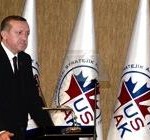On June 12, Recep Tayyip Erdogan, the most popular Turkish prime minister of the last half century, marked his third straight electoral win by averring his leadership over not only Turkey but the entire region. “Believe me,” he said in a victory speech, “Sarajevo won today as much as Istanbul; Beirut won as much as Izmir; Damascus won as much as Ankara; Ramallah, Nablus, Jenin, the West Bank, Jerusalem won as much as Diyarbakir.” The speech reaffirmed the foreign policy that Erdogan’s Justice and Development Party (AKP) has pursued since it came to power in 2002. As the AKP’s foreign minister, Ahmet Davutoğlu, puts it, Turkey’s goal has been to have “zero problems” with its neighbors. And over the past decade, Davutoğlu has dramatically improved Ankara’s relationships with capitals across the region through constant diplomatic engagement, fostering mutual trade, and opening national borders.
You can read exclusive content from Gateway House: Indian Council on Global Relations, here.
Copyright © 2011 by the Council on Foreign Relations, Inc.


